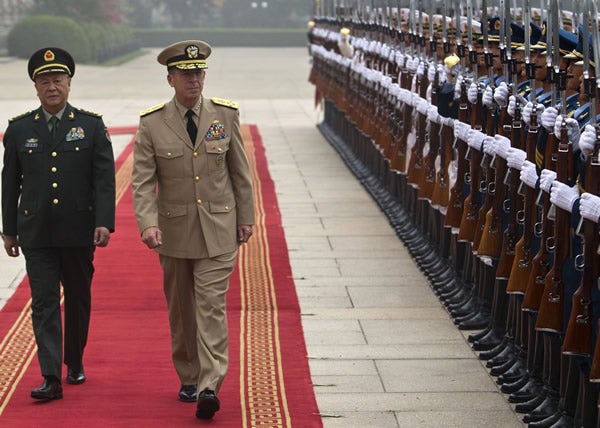‘Fight Fight, Talk Talk’: China’s Model for Military-to-Military Relations
Dean Cheng /
On the same day, we have two arguments presented about whether to increase military-to-military engagement of the Chinese military, also known as the People’s Liberation Army (PLA).
On the one hand, we have Admiral Mike Mullen, the outgoing chairman of the Joint Chiefs of Staff, arguing that the very act of engaging the Chinese in military-to-military talks will facilitate the creation of strategic trust. As Admiral Mullen states in his op-ed in The New York Times, dialogue is critical, because it clears up misunderstandings and helps keep a focus on shared interests.
On the other hand, we have Randy Schriver, previously senior director for China policy at the Pentagon and deputy assistant secretary of state for East Asia, and now head of a security and foreign policy think tank, Project 2049. Schriver notes that 30 years of military-to-military interaction have not led to greater PLA transparency, increased safety in Sino–U.S. military interactions, or greater cooperative approaches to challenges. Instead, efforts at engagement have led Beijing to believe that it has more leverage in military-to-military talks than Washington, because the U.S. appears almost desperate to have the talks, unlike China.
While both sides make valid points, the two sides are really talking past each other.
Admiral Mullen makes a mistaken assumption about the value the Chinese derive from the military contact. IF the hope is that China will come to accept Western concepts of transparency—and believe transparency is in its own interest—or come to view cooperation with the United States as a means of achieving its goals, then sustained interaction with the Chinese military would be desirable, even if there were occasional bumps (and even gaping potholes) in the road.
And there are areas where the U.S. and China share some security interests. Notably, these are all well away from the East Asian littoral, such as curbing piracy off Somalia. The problem is that those who would maintain U.S.–China military interaction hope that such temporary shared interests will somehow blossom into a meeting of the minds.
But there is little reason to think that the Chinese national security establishment (which includes the top political leaders) sees cooperation with the United States in the military realm as supporting China’s goals. Instead, the United States is seen as an obstacle—whether it is selling arms to Taiwan, encouraging a suitably multilateral solution to disputes in the South China Sea, standing by its treaty commitment to the defense of the Philippines, or otherwise tending America’s close alliances with Japan and South Korea. Given the tight legal restrictions on what can be shared with the Chinese, the one thing the talks do for the Chinese is to stave off the U.S. from pursuing its own national interest, for fear of jeopardizing U.S.–Chinese military-to-military links.
This is consistent with Mao Zedong’s tactic of “fight fight, talk talk (da da, tan tan).” Mao would negotiate, not in order to “get to yes” and reach a compromise solution, but to buy time, color his opponent’s views, and influence third parties. The ultimate goal never changed, whatever the negotiating positions.
In this regard, Admiral Mullen’s views are especially disturbing. While he is undoubtedly correct in noting the existence of substantial differences and the need for bluntness and honesty, what he fails to explain is exactly what higher American interests are served by the current military-to-military relations. He acknowledges that China so undervalues them that it is prepared to cut them off to communicate displeasure.
There is no harm in engaging the PLA or any nation’s military, as long as that engagement is conducted with a clear eye toward serving American interests. “Jaw-jaw” is not always better than “war-war.” Talking for the mere sake of talking, or in the belief that this will, in and of itself, lead to better relations or even “real trust,” misconstrues what will ultimately serve American security concerns.
The Chinese leadership very clearly understands this. Does the American leadership?

